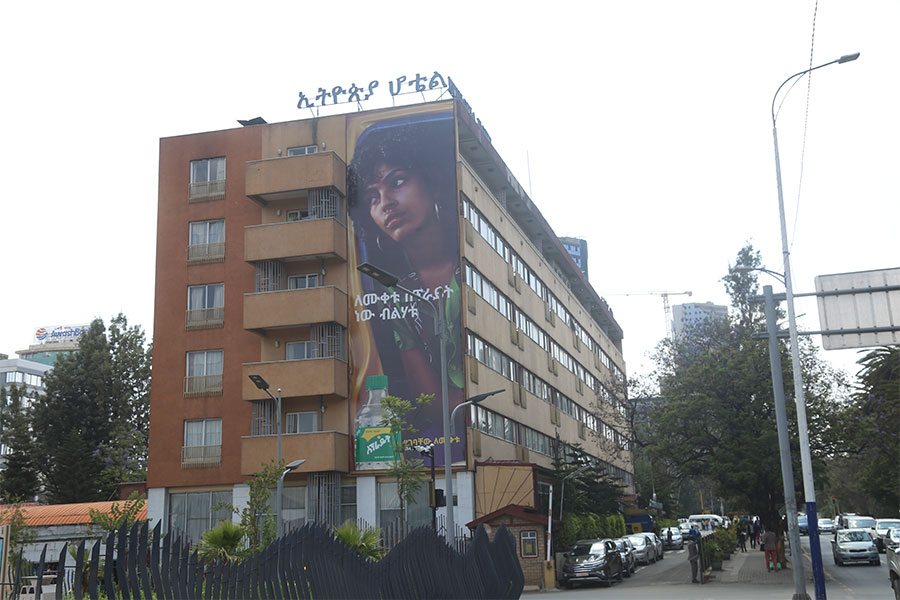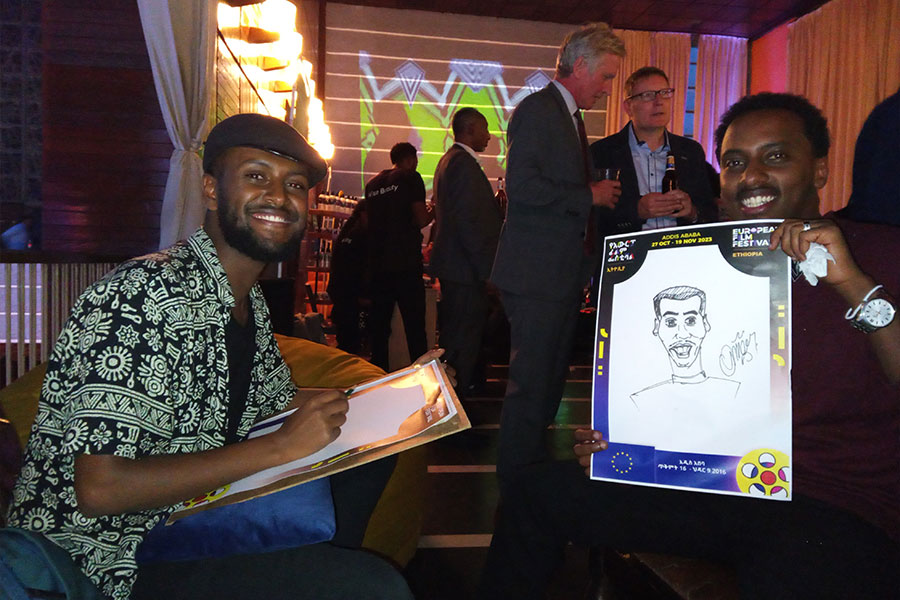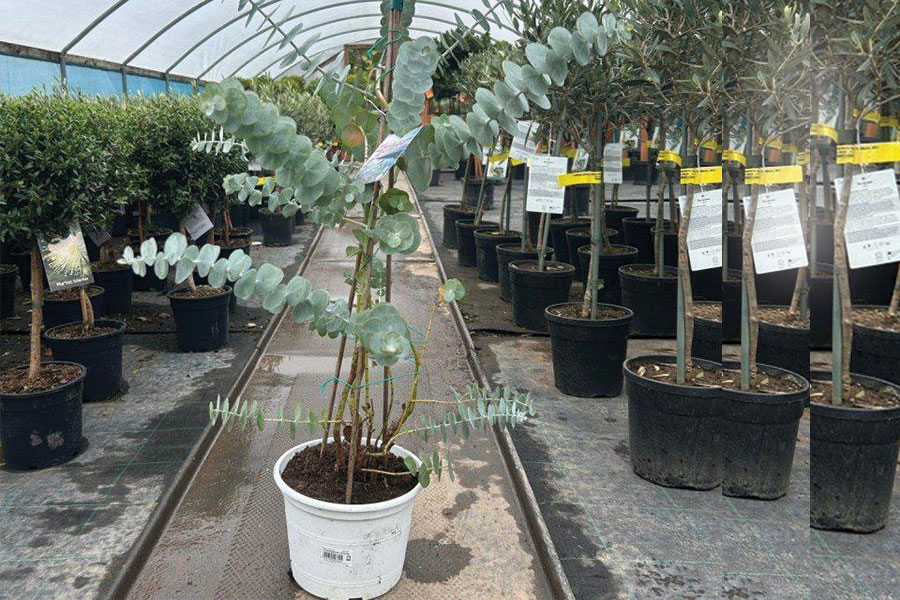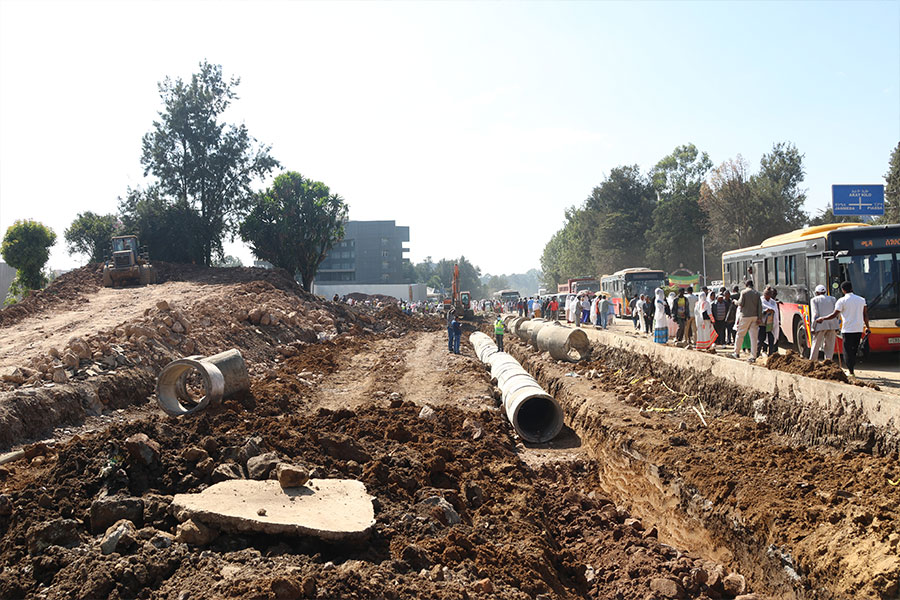
Featured | Apr 15,2023
On a sunlit afternoon three weeks ago, Misikir Abera, a.k.a MOX, was putting the finishing touches on a piece he so painstakingly worked on for the prior 10 days. Masked and wielding a brush, the 28-year-old artist gently stroked at the seven-meter-wide wall on Equatorial Gunia Street in Megenagna, eliciting awe from passersby.
"Africology" reads the centrepiece of the mural, which has three melanin-rich individuals looking out into different horizons; the woman who stares intensely out into space immediately catches the eye of the beholder.
Miskir's childhood fascination with art saw him venture into the study of architecture at Arba Minch University, where his drawings in the compounds of the university attracted attention.
"That made me decide to showcase my work to a wider public," he told Fortune.
Following a five-year adventure after college in which he toiled about painting in cafes and coffee shops while looking to break into the art scene painting smaller murals in his spare time, Miskir finally reached out to Wereda officials five years ago. Despite being hesitant at first, the officials granted him permission to display his pieces after being impressed by his work.
Miskir then scavenged the streets of Addis, looking for potential spaces to unbridle his visual prowess, finally managing to drape 50 locations in the capital with his brush. He draws inspiration from local history, folklore and landmarks, imbuing his pieces with a distinctly Ethiopian flavour.
"Winter is not exactly ideal for street artists," said Misikir.
An average of 10 days and 15,000 Br goes into every piece he paints, with every penny paid from his own pockets while a side gig as a driver and intermittent projects help him cover his losses.
"I only do it out of love," he told Fortune.
He believes to have been fortunate, as most other aspiring artists neither have the connections nor the finances to realise their musings. He recognises a deep discrepancy between artists' personalities and the bureaucratic environment he attributes to a lack of appreciation for art. Through the times, he has had several confrontations with law enforcement, even getting arrested on one occasion.
"I take risks when I put myself out there to draw," he underscored.
Street art has become a universal feature of the contemporary urban experience in the bustling concrete maze of cities. The streets of Addis have also slowly begun to grace the walls with colourful panoramic displays of artistry.
Urban street art is an eclectic expression encompassing graffiti, portraits, and fine art, all infused with expansive conceptual ideas.
City officials are coming to realise the potential of street art to breathe new life into rundown neighbourhoods and have been increasingly granting spaces for artists to express themselves.
A mural by MOX around the Megenagna area.
The capital's Arts, Culture & Tourism Bureau has been giving out permission letters to prospective artists who manage to file requests.
Abayneh Zigbale, the theatre & multimedia art team leader, says most street artists fail to recognise there is a way to obtain permits.
"We give out permissions if it aligns with the local community's culture," he told Fortune.
Abayneh indicated that a permission letter also solicits cooperation from other government bureaus such as the Roads Authority & the Beautification & Green Development Bureau. The team leader says there is a recognition of the utility of street art to attract tourism and upgrade the City's aesthetic appeal while it cannot provide financial support.
"Administrative support is all we can afford," Abayneh told Fortune.
The Bureau has been organising street festivals in a bid to bolster the art form.
"It has been underserved," he emphasised.
Dispersed artists have also been coming together with more vigour over the last few years as a generation takes up street art as a viable avenue of expression.
Founded by Solomon Kifle two years ago, Addis Street Art (ASA) has brought together graffiti artists, painters and graphics designers hoping to turn their passion into a business. A graduate of industrial design from Addis Abeba University, Solomon delved into street art six years ago after resigning from his job at a local company.
"No one had heard of street art where I come from," he recalls.
The 31-year-old started fashioning walls around the Piassa area, funding his passion with side gigs as a photographer and freelance designer. Despite street art being unpopular during the period, Solomon made connections at embassies and non-governmental organisations in a short time through competitions and a collaborative project by the European Union.
ASA now receives projects from commercial buildings and government offices to embellish them with images and positive messages.
"Sometimes we do them for free," said Solomon, disclosing that some projects pay up to half a million Birr.
The collective also provides links to 30 solo artists to find gigs at upcoming projects focusing on youth and women.
"The fledgling industry suffers from a shortage of support, making materials scarce and expensive," explains Solomon. He takes pride in revitalising rundown walls and spaces.
The history of urban street art traces itself to the city of Philadelphia in the 1960s, where the youth began to sign their names onto walls using spray paint; the trend later caught on in New York before engulfing the nation and then the world.
The past three years have been good for street artists in the capital with the Gothe Insitute, Alliance Ethio-Fransciase, and the Italian Institute of Culture taking the lead in promoting street art in Addis Abeba's landscapes.
A collaborative masterpiece between Italian and Ethiopian artists around Sarbet on Egypt Street has reproduced Michael Angelos's The Creation of Adam and references writer Dante Alighieri in a kaleidoscopic image.
According to Laura Antonetti, who hails from the cultural and administrative office at the Italian Institute of Culture, street art provides a palette of colours and ideas that revitalise otherwise monotonous walls.
She also suggests that it serves as a catalyst for cultural exchanges and business opportunities for the artists.
"Art is a widespread tool for presenting the local culture of a country," Laura told Fortune.
She has also noted a lack of advocacy and promotion from the government, highlighting street art's role in creating a visually vibrant urban landscape.
While falling short of the high expectations street art has still been getting some support from the city administration.
The Urban Beautification Development Monitoring Directorate under the capital's Urban Beautification & Green Development Bureau has received its first 30 million Br budget for the upcoming year from the total of 1.4 billion Br allocated to the bureau.
According to Almaz Kebede, who heads the bureau devoid of budgetary allocations for the past two years, street art instils a sense of identity in concrete landscapes.
"It goes beyond aesthetic appeal," she told Fortune.
The giant walls around Welo-Sefer and the Denbel area are productions of the bureau, managing to cover 4,000sqm of walls in total across the city.
"It has enriched the experience of visitors," she tells Fortune.
Almaz revealed that the bureau plans to cover 5,000sqm with street art in the coming year.
A new batch of reform has been cooked under the Addis Abeba City Administration Construction Permit & Control Authority, applicable to all street artists and advertisers.
The authority ushered a new directive oriented towards monitoring the city's artistic landscape in a bid to control illegal advertisements, paintings, posts, and billboards in public spaces.
"Official work will begin the coming year," said Addisu Melese, outdoor advertising director.
He said that anyone who performs any art in public spaces without receiving permission from the authorities will be in violation of the law.
According to the director, acquiring a permit will require meeting the standards compatible with zonal aesthetics, city landmarks, and infrastructure development. As the Authority has not issued any license thus far, fees will be charged for illicit use of the public space, indicates Addisu.
"It is becoming difficult to monitor every place," he said, betting on the new directive to mitigate the proliferation of illegal and immoral visuals across the city's walls.
Despite the city's crackdown on what it considers to be illegal and immoral advertising in public spaces, modern urban planners perceive street art as a part of the contemporary urban landscape.
For Nebiyu Yonas (PhD), an urban planner, architect, and Assistant professor at EiABC, street art significantly transforms neglected areas into vibrant and attractive spaces. He reasons that the growth of street art culminates in the beautification of urban spaces and the construction of a more dedicated, mature, and complex urban landscape.
"As the city is continuously evolving, the needs of residents evolve simultaneously," he said.
Nebiyu argues landscapes should evolve with contemporary tastes while underscoring that investments are necessary to fuel the transformation.
"Functionality and aesthetics will have to go in tandem," he said.
He suggests effective urban design policies to jumpstart a contemporary aesthetic metropolitan evolution in Addis Abeba.
PUBLISHED ON
Sep 10,2023 [ VOL
24 , NO
1219]

Featured | Apr 15,2023

Fortune News | Aug 02,2025

Radar |

Commentaries | Aug 09,2025

Radar | Jul 20,2025

My Opinion | Jul 19,2025

Radar | Jun 15,2025

Radar | Nov 20,2023

In-Picture | Dec 08,2024

Commentaries | Nov 18,2023

Dec 22 , 2024 . By TIZITA SHEWAFERAW
Charged with transforming colossal state-owned enterprises into modern and competitiv...

Aug 18 , 2024 . By AKSAH ITALO
Although predictable Yonas Zerihun's job in the ride-hailing service is not immune to...

Jul 28 , 2024 . By TIZITA SHEWAFERAW
Unhabitual, perhaps too many, Samuel Gebreyohannes, 38, used to occasionally enjoy a couple of beers at breakfast. However, he recently swit...

Jul 13 , 2024 . By AKSAH ITALO
Investors who rely on tractors, trucks, and field vehicles for commuting, transporting commodities, and f...

Oct 18 , 2025
The political establishment, notably the ruling party and its top brass, has become p...

Oct 11 , 2025
Ladislas Farago, a roving Associated Press (AP) correspondent, arrived in Ethiopia in...

Oct 4 , 2025
Eyob Tekalegn (PhD) had been in the Governor's chair for only weeks when, on Septembe...

Sep 27 , 2025
Four years into an experiment with “shock therapy” in education, the national moo...